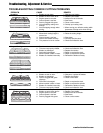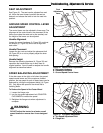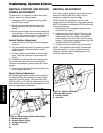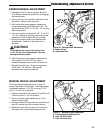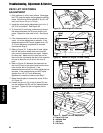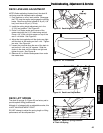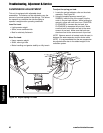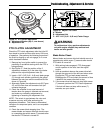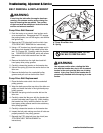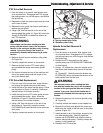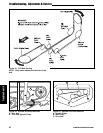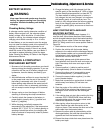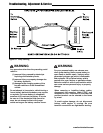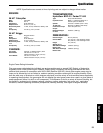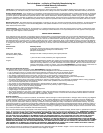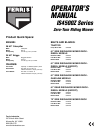
53
Specifications
ENGINE:
28 HP* Caterpillar
Make Caterpillar
Model 3011C
Horsepower 28 @ 3600 rpm
Displacement 69 Cu. in (1131 cc)
Electrical System 12 Volt, 40 amp. Alternator, Battery: 500
CCA
Oil Capacity 5.2 US qt. (4.9 L) w/ Filter
35 HP* Briggs
Make Briggs & Stratton
Model 613177
Horsepower 35 @ 3600 rpm
Displacement 61 Cu. in (993 cc)
Electrical System 12 Volt, 20 amp. Alternator, Battery: 500
CCA
Oil Capacity 2.4 US qt. (2.25 L) w/ Filter
CHASSIS:
Fuel Tanks Capacity: 15 Gallons (56.8 L) Total
Rear Wheels Tire Size: 24 x 12.00 -12
Inflation Pressure: 18 psi (1,24 bar)
Front Wheels Tire Size: 13 x 6.50 - 6
Inflation Pressure: 25 psi (1,72 bar)
TRANSMISSIONS:
HydroGear BDP-21 / Parker TF-040
Type Pump and Wheel Motor
Hydraulic Fluid Mobil 1™ 15W-50 synthetic oil or
Castrol Syntec™ 5W-50 oil
Speeds Forward: 0-10 MPH (0-16.1 km/h)
@ 3400 rpm Reverse: 0-5 MPH (0-8.05 km/h)
Continuous Torque 483 ft. lbs. (654 N.m.)
Output
Maximum Weight 3000 lbs. (1360 Kg)
on Axle
DIMENSIONS:
Overall Length 86-1/2” (220 cm)
Overall Width 75” (191 cm) - side discharge model
62” (158 cm) - rear discharge model
Height 52” (132 cm)
Weight (apx..)
With Side Discharge 1846 lbs. (837 kg)
Mower Deck
With Rear Discharge 1868 lbs. (847 kg)
Mower Deck
NOTE: Specifications are correct at time of printing and are subject to change without notice.
Specifications
Engine Power Rating Information
The gross power rating labels for individual gas engine models meet or exceed SAE (Society of Automotive
Engineers) code J1940 (Small Engine Power & Torque Rating Procedure) and rating performance has been
obtained and corrected in accordance with SAE J1995 (Revision 2002-05). Actual gross engine power may be
lower and is affected by, but not limited to, ambient operating conditions and engine to engine variability. Given
both the wide array of products on which engines are placed, and the variety of environmental issues applicable
to operating the equipment, the gas engine will not develop the rated gross power when used in a given piece of
power equipment (actual “on-site” or net horsepower). This difference is due to a variety of factors including, but
not limited to, accessories (air cleaner, exhaust, charging, cooling, carburetor, fuel pump, etc.), application
limitations, ambient operating conditions (temperature, humidity, altitude), and engine to engine variability.



